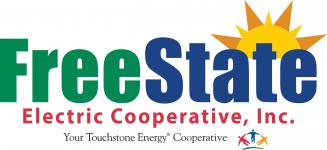Trustees will vote on a proposed $3 per month adjustment starting in January 2021 on Oct. 28 during special open board meeting. Members have a chance to provide input on decision.
For the past decade, members have not seen any adjustment to service charges. The last adjustments were in 2010 (East District, previously LJEC) and 2012 (West District, previously Kaw Valley). They key to consistency was the consolidation in 2017. True dollar savings paired with avoided costs put the cooperative on the right track, but revenue has been on the decline and expenses keep rising. A trend that is not changing.
“The cooperative’s operating costs increased by 10% from 2015 to 2019,” said Jill Taggart, FreeState’s finance manager. “A very mild 2020 means the co-op’s revenue energy sales has fallen 5% below our projections and this put added pressure on our finances as operating costs continue to rise because those operating margins shrink when sales are down.”
Not only have costs risen and temperatures evened, growth has stalled overall as an economic downturn has begun.
“We connected 242 new services in 2018 compared to just 160 in 2019,” said Steve Foss, FreeState’s CEO. “Slow growth paired with advanced technology has driven efficiencies across the territory resulting in lower revenue. We expect this trend to continue.
Foss added that energy efficiencies are a positive for members, but when it can make an impact to the co-op’s bottom line.
“It’s not only energy efficiencies,” Foss said. “FreeState leads Kansas cooperatives when it comes to member-generated power.”
“It’s something we’re happy about, and something we’ll continue to invest in to keep costs down for our members, but when we do these types of investments something gives on the other side,” added Foss. “We currently have just shy of 1.4 megawatts installed by our members.”
Foss says no changes in a decade is significant when compared to the investor owned utility that has raised rates 39 times during the same decade.
Consolidation savings have allowed the cooperative to absorb most of the increases.
“One thing we do want to point out is that there have been no changes since consolidation, and that’s all due to the realized savings of bringing two stable cooperatives together,” added Taggart.
“For FreeState to maintain the quality, reliability, and stability of the services we provide, we must take a comprehensive look at our revenue requirements and 10-year financial forecast,” Taggart said. “Our revenue requirement study (RRS) provided a comprehensive road map for management and the board.”
Members can forget that FreeState does not make a profit and there are no shareholders.
“We return any overages to members in the form of capital credits,” said Foss.
Since 2017, FreeState has returned over $1.5 million in capital credits and also returned $900,000 in margin stabilization to our East District members, including a consolidation credit of $800,000. However, 2020 saw capital credits delayed as a proactive measure.
“We want to make certain we are in a financial spot to retire those credits and we hope we are able to do that, but the pandemic proved otherwise,” Foss said.
“More than 80% of the cooperative’s expenses are not controlled by the cooperative,” Foss said. “We do not control the cost of environmental regulations, property taxes, materials, labor and transportation, the list of costs is lengthy.”
The Small Adjustment Will Be Adequate
Trustees were given a suggested service charge amount near $40 10 years ago but made the decision to keep the charge lower.
“We aren’t even close to that suggested amount,” said Foss.
Members will see the first adjustment on the February 2021 bill. The adjustment will be $3 each month or $36 per year. In February 2022, 2023, and 2024 an additional adjustment of $1 will be made. The total adjustment will be $6 total over the next four years.
“Even with a minimal adjustment we will still be well below the previously suggested amount and we intend to keep it there as long as possible,” added Foss.
Members Can Provide Feedback
Trustees will vote in a special open board meeting on Wednesday, Oct. 28.
The meeting will be held both in-person (McLouth warehouse due to COVID-19 restrictions) and virtually to offer a safe alternative for participating. The cooperative will also be giving members the opportunity to provide feedback from Oct. 1 through 23.
“We are streaming our meeting on our website, and there is a form there where members can provide feedback directly to us,” Foss said. “All comments will be delivered for the board to review before they take action on the proposed adjustment.”
“The board will be provided comments collected,” Foss added “We want our members to engage and be part of the process.”

